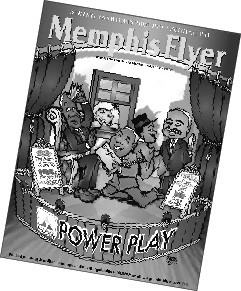In 2006, the Memphis Film Forum opened its seventh edition of the Memphis International Film Festival with a special sneak preview of New Orleans Music in Exile, Robert Mugge’s downbeat documentary about Crescent City musicians coping with the devastation caused by Hurricane Katrina. As the closing credits rolled at the Paradiso theater and the attending filmmaker received his due ovation, Cowboy Mouth, a hard-touring New Orleans band prominently featured in Mugge’s film, launched into “Jenny Says” and electrified a near-capacity crowd at Newby’s, miles away on the Highland strip.
The timing of these two potentially synergistic events was purely coincidental. There was no official cross-promotion, no shuttle service trafficking festival attendees between the two venues. Was the Memphis International Film Festival failing to capitalize on this happy accident and its host city’s reputation as the primal nexus of modern American music? Could be.
“Our identity is about to change,” says Memphis Film Forum chairman Lisa Bobal. “The nature of living in a musical city like Memphis means we always get this great selection of music-oriented films. So in the future we’ll be moving more toward becoming a film and music festival.”
With its International Masters series and a selection of movies and music videos from around the globe, MIFF’s 2007 festival has plenty to offer fans of world cinema. But for all the foreign affairs, this year’s 58-film lineup has an unmistakably Southern accent. Oh Mr. Faulkner, Do You Write?, which opens the festival, is an effective concert film showcasing John Maxwell, an actor who has spent the last 26 years touring the world in a lyrical one-man show about Mississippi modernist William Faulkner.
Four very different documentaries — Living the Blues, Iron City Blues, Hard Times, and The Clarksdale Jook Joint Jam — explore and exploit different facets of the music that made Beale Street famous. The apocalyptic short film Quincy & Althea is a black comedy set in post-Katrina New Orleans with landscapes as futuristic and frightening as they are familiar.
“All of this happened on its own,” Bobal says.
Over the next five years, the Memphis Film Forum and its new concert-promoting sponsor, TCB Entertainment, will actively transform MIFF into an event that celebrates cinema all day and music all night.
The epiphany to change directions struck at the International Film Festival Summit, when Bobal was talking to Film Threat editor and author of The Ultimate Film Festival Survival Guide, Chris Gore, who was shocked to discover that a festival in Memphis didn’t have a strong musical component. When he asked why she didn’t capitalize on the city’s musical reputation, Bobal only had one answer.
“We’re all volunteers,” she says. “We just haven’t had the manpower … . But now with TCB as our sponsor, I’m confident we can step up the entertainment.”
There’s no ongoing musical component attached to this year’s festival, although Craig Schuster, a songwriter and pianist with a flare for Detroit soul and Southern rock, will play the festival’s Rat Pack-themed awards party at the Warehouse, 36 G.E. Patterson, on Saturday, March 24th. Admission to the party is $10 at the door, though festival-pass holders get in free.
Blues Notes
Films about hard times, disaster, destruction,disruption, and lawn-mower racing.
It’s 1958, and a 22 year-old, trench-coat-clad Dan Rather reports from the scene of an unspeakable terrorist attack on the American homeland: “Right now I’m standing in front of Clinton High School in Clinton, Tennessee,” he says. “Last night, it was rocked by a bomb blast. The Tennessee Bureau of Investigation, the Federal Bureau of Investigation, and the state fire marshal are investigating.”
The Clinton 12, Keith Henry McDaniel’s exhaustive, interview-driven documentary about the first integrated public high school in the South after the Supreme Court decision in Brown v. Board of Education, is a detailed portrait of dark and troubled times. James Earl Jones narrates the story of a black and white community that stood shoulder to shoulder — prejudices intact — to fight for justice against a wave of violent racial hatred. Its score is all improvisational jazz, but the interviews ring with the unmistakable sounds of white Southern gospel and gutbucket blues.
It’s just one of several films selected to appear at this year’s MIFF that deals with hardships and cultural unrest and that causes voices to be raised in song. Doug Lenox’s short film Quincy & Althea uses an uneventful domestic squabble between the title characters as a device to put New Orleans’ shattered, hopeless landscape on the big screen. Though set in New York, Cadillac Man tells the true blue story of a homeless man who finds success as a writer but is incapable of returning to a more conventional lifestyle.
Four other documentary films take a close look at the occasionally joyous, often sorrowful music born of hardship. Collectively, these films exult and exploit the song of the South and present a clear, sometimes disquieting picture of the 12-bar form we call the blues.
Living the Blues
Everybody knows the romanticized image of the bluesman. He’s a hard-drinking, fast-loving rapscallion with a guitar tuned by Satan and a gift for signing bad recording contracts. The familiar image doesn’t seem quite so romantic in Tim Bryant’s documentary, Living the Blues, an intimate portrait of nine elderly and often obscure blues artists, including Precious Bryant, Neal Pattman, and Etta Baker.
Bryant’s filmmaking style is visually static. The stories and music, however, are vibrant, colorful, and occasionally explosive. Pattman, a salty shouter and harmonica virtuoso, talks about losing his arm and the constant need to “come up fighting.” Rufus McKenzie angrily declares that he’s never been out of slavery and sadly recalls a time when a seemingly kind white couple served him a sandwich in their dog’s bowl. This film is the real deal, filled with loss, fury, joy, and, of course, music.
Iron City Blues
Biker and blues artist Big Mike Griffin wasn’t afraid to visit Iron City, Tennessee, a secluded town on the Alabama border that hasn’t had a police officer on the town payroll since the last one was run off in 1989.
“I’m 6′-10″ and had my trusty 40-cal. Glock with me,” he says. “So I felt really secure.”
Scott Jackson’s Iron City Blues is a frustrating but ultimately fascinating snapshot of a scary and occasionally bizarre world of meth, moonshine, kids racing lawn mowers — and bodies floating in the river. It’s also a less-than-satisfying document of how Big Mike turns his experiences in Iron City into a blues song.
“As far as I know, nobody’s ever made a documentary about how a blues song is made,” Jackson explains. “And I thought that would be an interesting way to approach the film.” Unfortunately, Big Mike and his “A-Team” of musicians aren’t nearly as interesting as Iron City’s last police officer, a mayor who can’t help “looking the other way,” or Monkey Tidwell, a 73-year-old gnome who loves his whiskey and knows where all the bodies are buried.
At its best, Iron City Blues captures a quirky, undeniably intimidating community of gun-toting rebels who would rather die free than live by somebody else’s rules. And then there’s Big Mike’s blues, which isn’t bad, but it can’t hold a candle to cigar-chomping children who delight in shooting blue lights off cop cars.
Hard Times

Scene from The Clinton 12
Filmmaker Damien Blaylock has martial artist turned musician Steven Seagal to thank for his recent exposure to the blues — and for Hard Times, a documentary portrait of St. Louis’ best-dressed harmonica player, Big George Brock.
“I was in Memphis working on a project for [Seagal]. He was bringing in all these guest artists, and that’s where I met Big George,” Blaylock says. It’s also where Blaylock and Roger Stolle, the blues and folk-art enthusiast behind Cat Head productions in Clarksdale, Mississippi, came up with the idea for creating a short promotional film about Brock’s life and career as a St. Louis tavern owner who’s played with artists like Howlin’ Wolf, Muddy Waters, and Jimmy Reed.
“We realized pretty quickly that we were going to have to do something bigger than a short,” Blaylock says.
Hard Times follows Brock from St. Louis to the Mississippi cotton fields where he was born and raised. Even if all the close-up shots of Brock’s giant, ring-laden hands picking cotton are ultimately exploitive, any one of them would make a great album cover.
“I guess [my film] could be seen as propaganda,” Blaylock says, explaining why he only interviewed Brock and nobody else. “My goal was to make it a detailed portrait of him and his world.”
The Clarksdale jook joint jam
While driving through Mississippi working as consultant for the Robert Johnson estate, musician and producer Gary Vincent had an epiphany. “All the juke joints are disappearing,” he says. “There are lots of reasons: hip-hop, drugs … .” Vincent realized that somebody needed to preserve the authentic spirit of the Mississippi roadhouse on film.
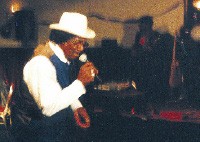
Hard Times
Initially, Vincent planned to make live recordings of the regional musicians who play Ground Zero Blues Club, actor Morgan Freeman’s fabulously funky blues club. “But I realized that if we produce a lot of unknowns, we won’t sell a lot of product,” Vincent says. That’s when he came up with the idea of The Clarksdale Jook Joint Jam, a series of concerts shot at Ground Zero and featuring a slate of established recording artists playing alongside the bluesmen who influenced them.
“I don’t buy into the theory that real blues has to sound ratty,” Vincent says. “But you can make it too slick. Fortunately, you can’t make people like George Thorogood or Delaney Bramlett sound too slick.”
The first installment of The Clarksdale Jook Joint Jam preserves the authentic spirit of Delta juke joints by paring Delaware destroyer George Thorogood, whose inescapable hit “Bad to the Bone” has been featured in countless films and TV commercials, with Muddy Waters’ and Howlin’ Wolf’s saxman Eddie Shaw. The concert doc opens with Thorogood telling a whopper about how he gave Shaw and the Wolf their start in show business. Cute.
Being William Faulkner
Even director Jimbo Barnett isn’t quite sure what to make of his film Oh Mr. Faulkner, Do You Write?
“It’s always a tough sell putting a stage play on film,” Barnett says, “and I guess that’s why we tried so hard to disguise it as much like a movie as we could.”
Barnett has little need to worry, though his “disguise” — glamour shots of Maxwell walking through Oxford, Mississippi — is about as effective as putting a pair of sunglasses on an elephant.
Oh Mr. Faulkner is unmistakably a cinematic document of a live event, in the spirit of Spalding Gray’s Swimming to Cambodia. As Maxwell (playing Faulkner) holds forth on such topics as race, politics, and the death of his brother, the film captures the dark humor and cantankerous nature of one of literature’s most difficult personalities. If anything, the artificial construct is refreshing. The famously pithy author springs vividly from the screen, holding viewers in his thrall from the first grumpy salutation.
“That’s all because of John Maxwell,” Barnett says. “He’s a true Mississippi treasure.”
Memphis Flyer: It can’t be easy living in such close quarters with William Faulkner for 27 years.
John Maxwell: Well, I only know a very small part of who Faulkner was, and I don’t claim to do a definitive portrait. When I walk out on stage, I hope Faulkner is there with me. But he’s not around if I’m not on stage. Right now, I’m living in a kind of dream bubble. I never thought that I could make a living as an actor in Mississippi. But I have.
What was the inspiration for creating the piece?
I came up with the idea for doing a one-man show about Faulkner when I was teaching community college in Jackson, Mississippi. His letters had just come out, and when I read them, I told my wife Sandy, “I don’t know if I can do this, but I think there’s material here for a play.”
What was the attraction?
I guess it’s like reading any of the classics. I was attracted to the author’s internal rhythms. It goes beyond the cerebral and touches the soul. I know some people get tangled up in Faulkner’s convoluted sentence structures, but I grew up on a cotton farm in Pickens, Mississippi, and I know these rhythms. When I read these books, I have an emotional response — deep, archetypal kinds of feelings.
Does the passage of time change the play — either how you perform it or how audiences respond?
Well, my age affects it, certainly. I was 35 when I started doing it, and I’m 62 now. I used to have to age up, now I try to age down. And there are parts I play much differently than I did when I started. At some point, I realized I just needed to trust the material, settle in, and ride it to wherever it took me.
You’ve performed all over the world. Is any one audience better than the other?
I don’t like to generalize large groups of people, but Southern audiences are usually the best. They understand storytellers. They see the twinkle in Faulkner’s eye, and they get it. I feel no moral responsibility to tell the truth, but as a storyteller, I do have an ethical responsibility to entertain.
Memphis International Film Festival Schedule
Thursday, March 22, 2007
7:30 p.m. A Very Small Trilogy of Loneliness 7 min.
Short
Oh Mr. Faulkner, Do you Write? 83 min. Feature
Friday, March 23, 2007
2:30 p.m. International Masters – The Flower of Evil
– Claude Chabrol 104 min. Feature
2:30 p.m. Hello Again Everybody/Messenger
80 min. Documentary
4:30 p.m. The Silent/Beautiful Dreamer
116 min. Short/Feature
4:30 p.m. Soul of Justice/Building Bridges
75 min. Documentary
7:30 p.m. The Clarksdale Jook Joint Jam/Iron City Blues
97 min. Documentary
10 p.m. International Masters – All About My
Mother – Pedro Almodóvar 101 min. Feature
Midnight Cutting Edge Shorts: A.W.O.L., Broken,
Deface, The Grass Grows, A Perfect Day,
The Projectionist 95 min. Shorts
Midnight Music Videos: Gone,
The Squares-I’m Sorry You’re Perfect, Lost, She’s a Dog,
Slowly Surfacing, Twenty, Rock ‘N Tokyo
164 min. Music Videos
Saturday, March 24, 2007
10 a.m. Of Good Courage 61 min. Documentary
10 a.m. The Clinton 12 88 min. Documentary
Noon Hard Times/Living the Blues
109 min. Documentary
Noon Mojave Phone Booth 88 min. Feature
2:30 p.m. Comedy Shorts: Alive and Well,
And Now a Word From Our Sponsors,
Bye Bye Benjamin, The Frank Anderson, Karma Cafe,
Quincy & Althea 73 min. Shorts
2:30 p.m. An American Opera
92 min. Documentary
4:30 p.m. Animated Shorts: Barney the Terrier,
Everything Will Be Okay, Idea Development, Mirage,
Nasuh, Saul Goodman, The Waif of Persephone
76 min. Shorts
4:30 p.m. Forgiven 83 min. Feature
7 p.m. Isaac Hayes Tribute Feature
9:30 p.m. International Masters –
The Devil’s Backbone – Guillermo del Toro 106 min.
Feature
9:30 p.m. MIFF 8 awards party at
the Warehouse
Sunday, March 25, 2007
Noon Forfeit 83 min. Feature
Noon Stirring it Up/By the Side of the Road
142 min. Documentary
Noon International Masters – All About My Mother
– Pedro Almodóvar 101 min. Feature
2 p.m. Do Not Go Gently/Cadillac Man
93 min. Documentary
3 p.m. Cutting Edge Shorts: Grace, Broken,
Making Do, Pop Foul, Raw Footage, Rosario, Tell
Tale, Thomas in Bloom 108 min. Shorts
4:30 p.m. A Map for Saturday 90 min. Feature
5 p.m. Vanaja 111min. Documentary
7:30 p.m. International Masters –
Goodbye, Dragon Inn – Ming-liang Tsai – 82 min.
Feature
7:30 p.m. Last Flight Home 70 min. Documentary
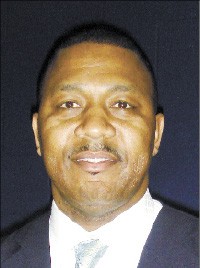 Jackson Baker
Jackson Baker 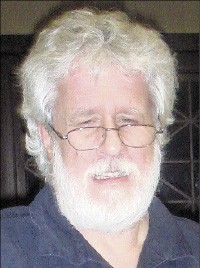 Jackson Baker
Jackson Baker 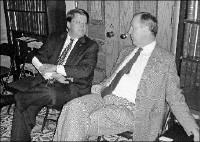 Jackson Baker
Jackson Baker 